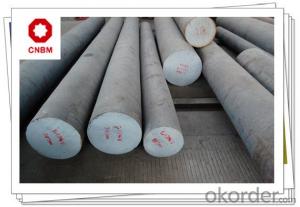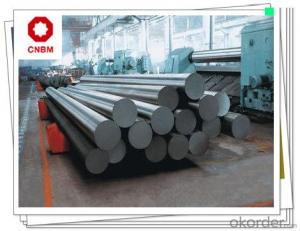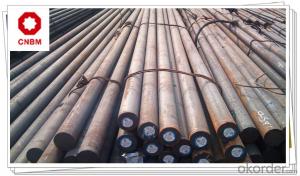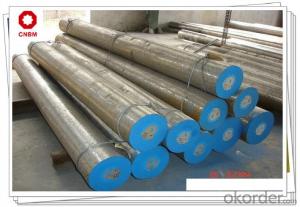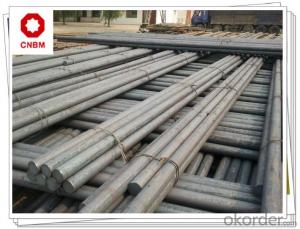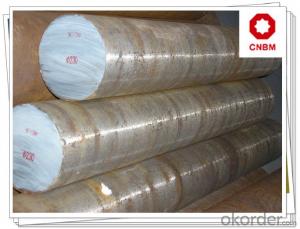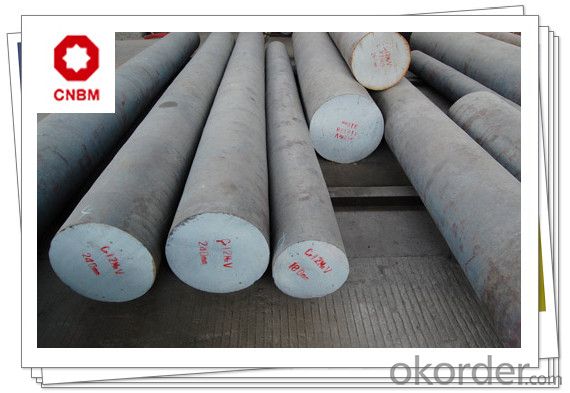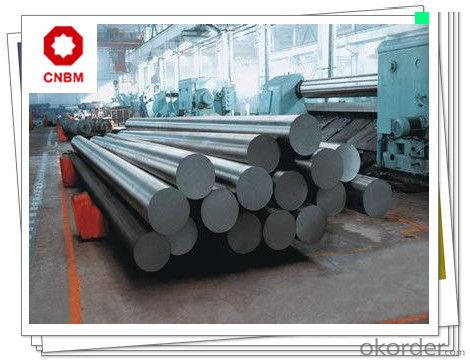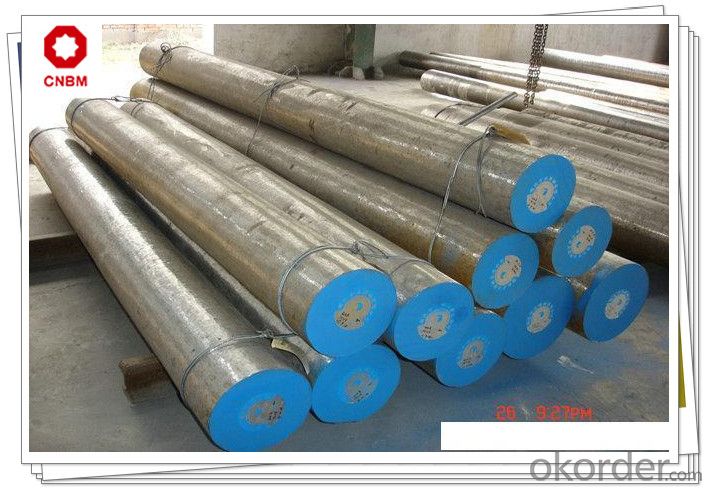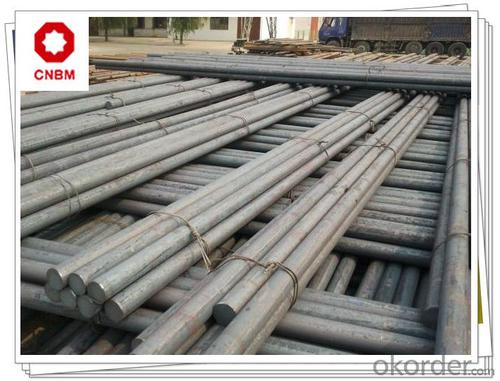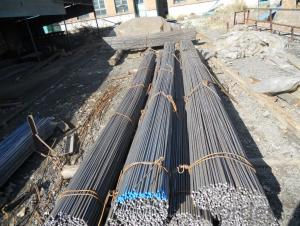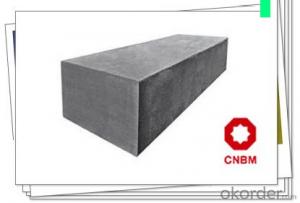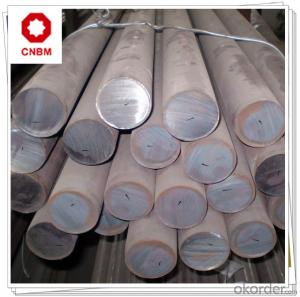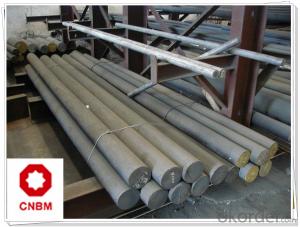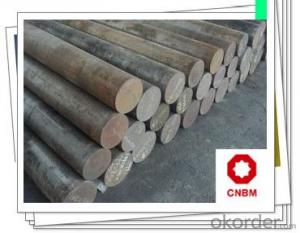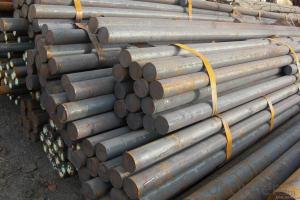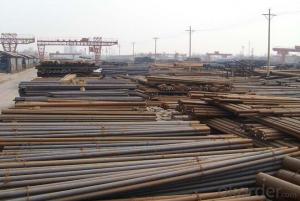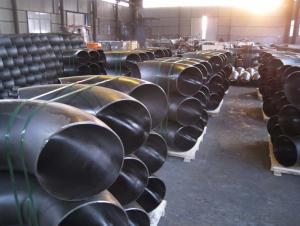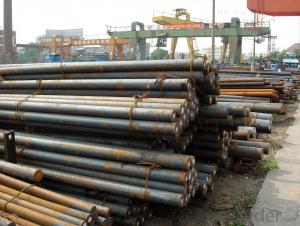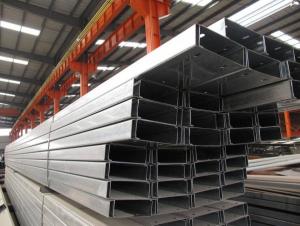C45 Density of Carbon Steel
- Loading Port:
- Shanghai
- Payment Terms:
- TT OR LC
- Min Order Qty:
- 30 m.t.
- Supply Capability:
- 120000 m.t./month
OKorder Service Pledge
OKorder Financial Service
You Might Also Like
C45 Density of Carbon Steel
Specification
1, Diameter: 8mm-250mm rounds
5mm-9mm rods
2, Length: 2m, 3m, 5.8m, 6m or customized
3, Standard: GB, ASTM, AISI, SAE, DIN, JIS, EN
OEM technology - send detailed technical parameters for accurate quotation.
2, Produce Process: smelt iron - EAF smelt billet - ESR smelt billet -
hot rolled or forged to get the steel round bar and plate
3, Heat Treatment: annealing, normalizing, tempering, quenching
4, Surface Treatment: Black, Polished, Galvanized
5, Quality Assurance: We accept third party inspection for all orders.
You can ask testing organizations such as SGS, BV, etc. to test our products before shipping.
Chemical Component
| C | Si | Mn | P | S | Cr | Ni | Cu |
| 0.42~0.50% | 0.17~0.37% | 0.50~0.80% | ≤0.035% | ≤0.035% | ≤0.25% | ≤0.25% | ≤0.25% |
Products Show
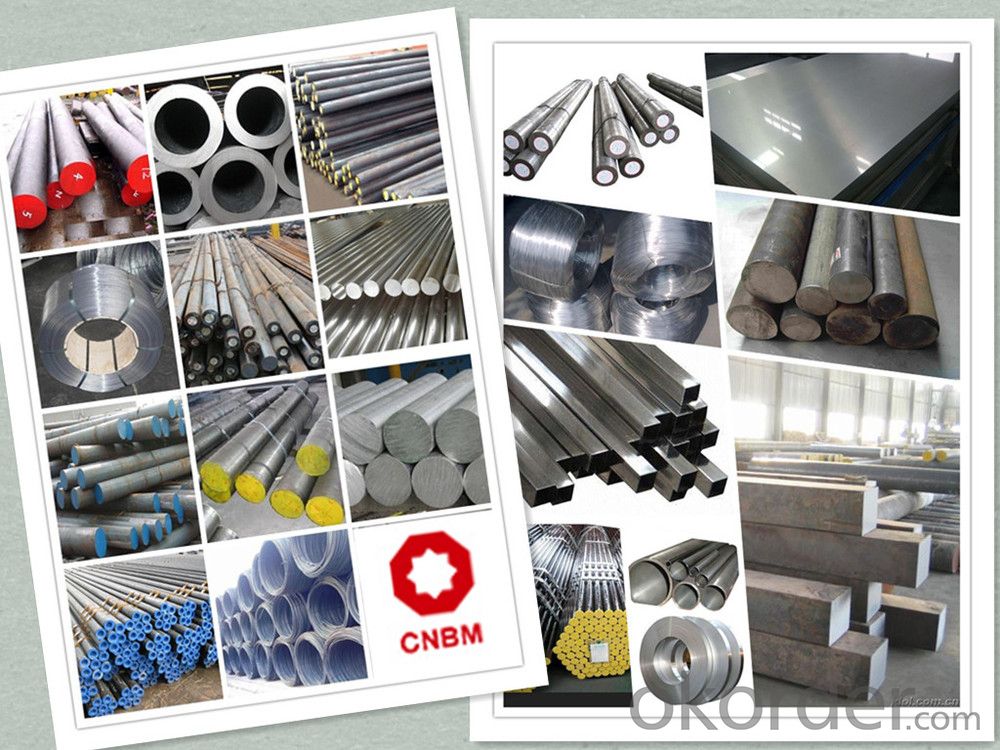
Work Shop
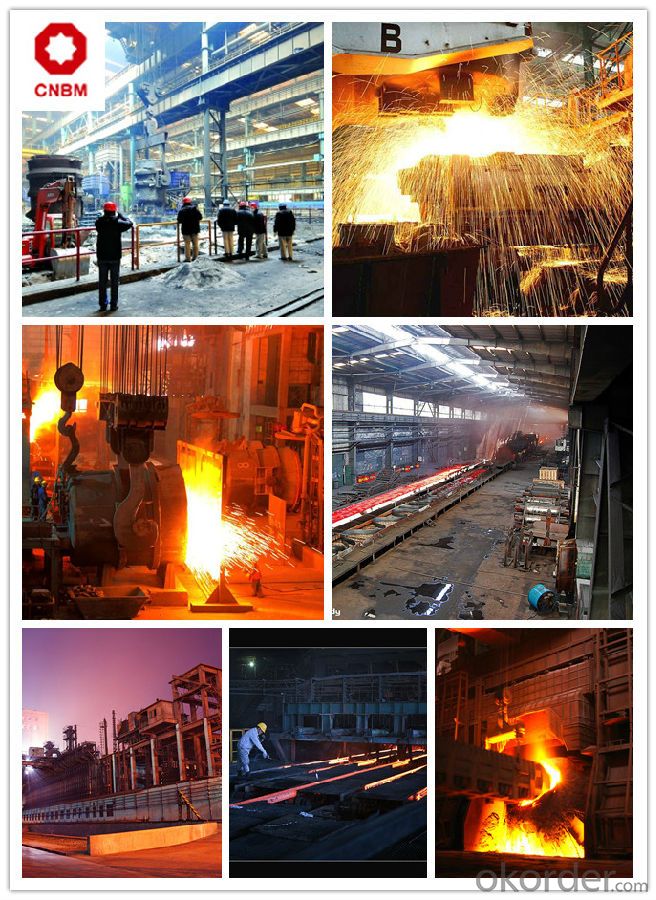
Company Information
CNBM International Corporation is the most important trading platform of CNBM group.
Whith its advantages, CNBM International are mainly concentrate on Cement, Glass, Iron and Steel, Ceramics industries and devotes herself for supplying high qulity series of refractories as well as technical consultancies and logistics solutions.

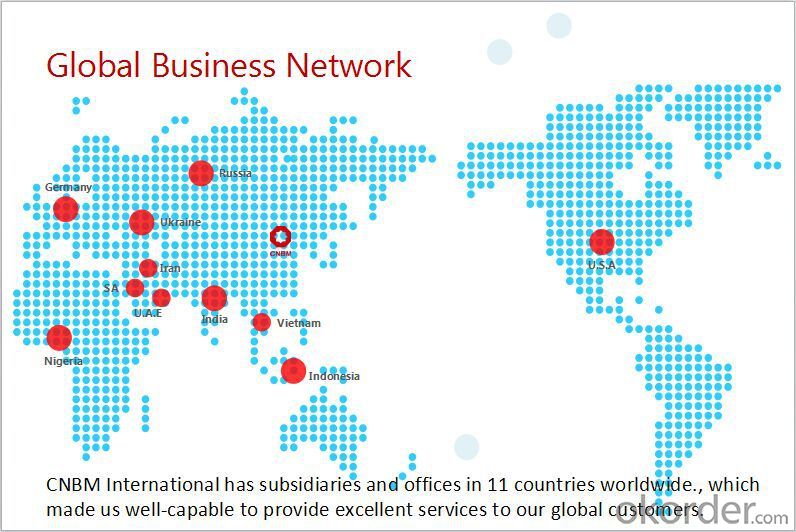
FAQ
1, Your advantages?
professional products inquiry, products knowledge train (for agents), smooth goods delivery, excellent customer solution proposale
2, Test & Certificate?
SGS test is available, customer inspection before shipping is welcome, third party inspection is no problem
3, Factory or Trading Company?
CNBM is a trading company but we have so many protocol factories and CNBM works as a trading department of these factories. Also CNBM is the holding company of many factories.
4, Payment Terms?
30% TT as deposit and 70% before delivery.
Irrevocable L/C at sight.
5, Trading Terms?
EXW, FOB, CIF, FFR, CNF
6, After-sale Service?
CNBM provides the services and support you need for every step of our cooperation. We're the business partner you can trust.
For any problem, please kindly contact us at any your convenient time.
We'll reply you in our first priority within 24 hours.
Packaging & Delivery
1, Packaging: seaworthy package or as required
2, Delivery: 35-45 days or based on quantity
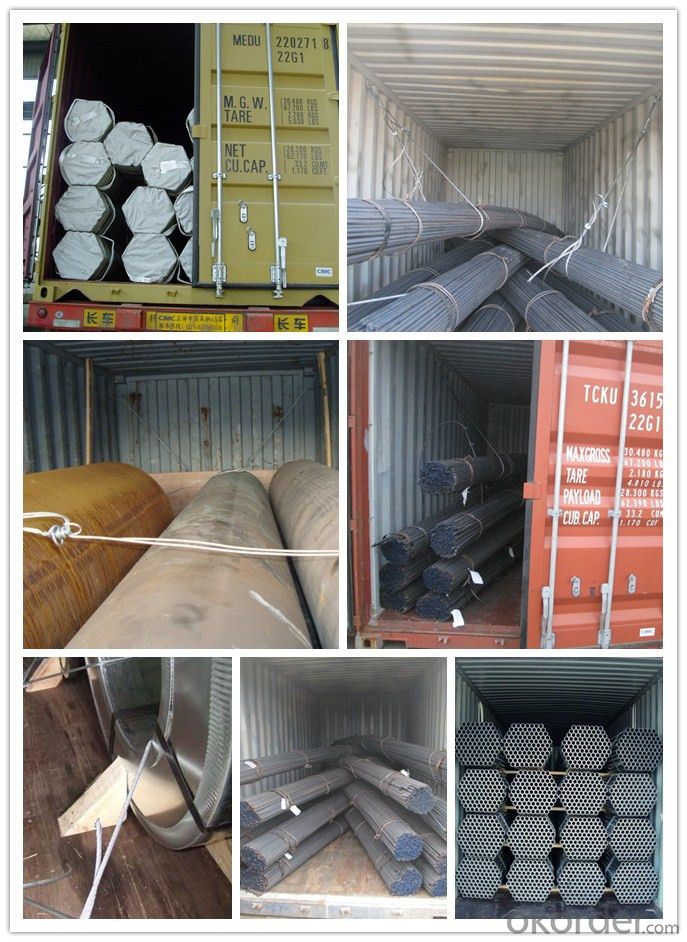
- Q: Can steel round bars be used for making gears or sprockets?
- Yes, steel round bars can be used for making gears or sprockets. Steel is a commonly used material in gear and sprocket manufacturing due to its high strength, durability, and resistance to wear and tear. Steel round bars can be machined or forged into the desired shape and then cut, drilled, or milled to create the necessary teeth or grooves required for gear or sprocket functionality. The specific type of steel and its heat treatment can be chosen based on the application requirements, such as load capacity, speed, and environmental conditions. Overall, steel round bars are a versatile and reliable choice for manufacturing gears and sprockets.
- Q: What are the different types of steel round bars used in the automotive steering systems?
- In automotive steering systems, there exists a range of steel round bars with distinctive properties and advantages. 1. Carbon Steel Round Bars: These round bars are extensively utilized in automotive steering systems due to their superior strength and durability. They are suitable for various steering components like tie rods and drag links. Additionally, carbon steel round bars are cost-effective and readily accessible, making them a popular choice in the automotive industry. 2. Alloy Steel Round Bars: By incorporating alloying elements such as chromium, nickel, and molybdenum into carbon steel, alloy steel round bars enhance their strength, hardness, and wear resistance. They are particularly useful in high-stress areas of the steering system, including steering shafts and steering knuckles, where additional strength is required. 3. Stainless Steel Round Bars: Stainless steel round bars are renowned for their exceptional resistance to corrosion, making them ideal for steering components exposed to harsh environments or moisture. Steering column shafts and tie rod ends frequently incorporate stainless steel round bars. 4. Tool Steel Round Bars: Steering system components that demand high hardness, wear resistance, and toughness often utilize tool steel round bars. These bars are commonly employed in the production of steering gears and other precision steering components. 5. High-Strength Low-Alloy (HSLA) Steel Round Bars: HSLA steel round bars, a type of alloy steel, offer a favorable balance between strength, toughness, and formability. Lightweight steering system components often employ HSLA steel round bars to reduce weight while maintaining structural integrity. Ultimately, the selection of steel round bars in automotive steering systems depends on factors such as the specific application, desired strength, durability, and corrosion resistance. Manufacturers carefully choose the appropriate steel type to ensure optimal performance and safety in steering systems.
- Q: Can steel round bars be used for making medical equipment?
- Yes, steel round bars can be used for making medical equipment. Steel is a strong and durable material that can be easily shaped into various forms, including round bars. These round bars can be further processed and machined to create different components or structures required in medical equipment such as surgical instruments, implantable devices, and hospital furniture. Additionally, steel is also known for its corrosion resistance, making it suitable for applications in the medical field.
- Q: How do I choose the right grade of steel round bar for my application?
- To select the appropriate grade of steel round bar for your needs, it is crucial to carefully consider various factors. Here are some guidelines to assist you in making an educated decision: 1. Begin by understanding the specific requirements of your application. Take into account factors like load-bearing capacity, resistance to corrosion, temperature endurance, and any applicable industry regulations or standards. 2. Determine the mechanical properties necessary for your application. Depending on the specific use, you may require certain properties such as strength, hardness, toughness, or ductility. Prioritize these properties based on their significance to your application. 3. Assess the environmental conditions in which the steel round bar will be used. This includes factors like exposure to moisture, chemicals, high temperatures, or abrasive surroundings. Certain grades of steel offer better resistance to corrosion or heat, rendering them more suitable for specific conditions. 4. Seek guidance from experts if you are uncertain about the most suitable grade of steel for your application. Consult metallurgists, engineers, or suppliers who can provide valuable insights based on their expertise and experience. 5. Compare and contrast different grades of steel round bars available in the market once you have a clear understanding of your application requirements. Consider factors such as composition, manufacturing process, and specific properties associated with each grade. Look for grades that closely align with your requirements. 6. Review the industry standards and specifications to determine if any specific grades are mandated for your application. These standards can offer guidance and ensure compliance with safety and quality requirements. 7. Evaluate the cost-effectiveness of various grades by considering factors like initial purchase cost, maintenance and replacement expenses, and the overall lifespan of the steel round bar. 8. If possible, conduct tests or trials using different grades of steel round bars to assess their performance in your specific application. This will provide valuable data to aid your decision-making process. By following these steps and taking all relevant factors into account, you can efficiently and effectively select the appropriate grade of steel round bar that meets the demands of your application.
- Q: What are the advantages of using oil-hardening steel round bars?
- There are several advantages of using oil-hardening steel round bars in various applications. Firstly, oil-hardening steel round bars offer excellent wear resistance. This means that they can withstand repeated contact with abrasive materials or surfaces without experiencing significant wear and tear. This makes them suitable for use in industries such as manufacturing, construction, and mining where materials are subject to high levels of wear. Secondly, oil-hardening steel round bars exhibit high strength and toughness. This means that they can withstand heavy loads and impacts without fracturing or deforming. This makes them ideal for applications that require materials with high structural integrity, such as in the production of machinery, tools, and equipment. Additionally, oil-hardening steel round bars have good machinability. This means that they can be easily shaped, cut, and formed into various components or parts without compromising their strength or performance. This makes them highly versatile and suitable for use in a wide range of manufacturing processes. Furthermore, oil-hardening steel round bars have excellent dimensional stability. This means that they are resistant to warping, twisting, or shrinking under different temperature conditions. This property ensures that the components or parts made from these bars maintain their original shape and dimensions, even when exposed to extreme temperature variations. Lastly, oil-hardening steel round bars are relatively cost-effective compared to other types of steel. They provide a balance between high performance and affordability, making them a popular choice in various industries. Overall, the advantages of using oil-hardening steel round bars lie in their excellent wear resistance, high strength and toughness, good machinability, dimensional stability, and cost-effectiveness. These properties make them a reliable and versatile material for a wide range of applications.
- Q: Are steel round bars used in the automotive industry?
- Steel round bars are widely utilized in the automotive industry. They find their application in diverse areas like the production of engine components, suspension systems, chassis, and axles. Due to their exceptional strength, durability, and versatility, steel round bars are highly favored for automotive parts that demand exceptional performance and reliability. Moreover, steel's capacity to endure heavy loads and its resistance to deformation make it well-suited for critical automotive applications prioritizing safety.
- Q: How are steel round bars measured and specified?
- Steel round bars are measured and specified based on their diameter. The diameter of a round bar is typically measured in millimeters (mm) or inches (in). The measurement is taken across the widest point of the circular cross-section. In terms of specification, steel round bars are commonly specified by their diameter and length. For example, a specification for a steel round bar may be written as "25mm diameter x 3 meters length". This means that the bar has a diameter of 25mm and a length of 3 meters. Additionally, steel round bars may also be specified based on their tolerance, surface finish, and grade. Tolerance refers to the allowable deviation from the specified diameter. Surface finish refers to the quality of the bar's surface, which can range from rough to smooth. Grade refers to the quality and composition of the steel used to make the round bar, such as mild steel, carbon steel, or alloy steel. It is important to accurately measure and specify steel round bars to ensure that they meet the required dimensions and properties for a particular application.
- Q: How do steel round bars perform in low-temperature environments?
- Steel round bars generally perform well in low-temperature environments due to their inherent strength and ductility. However, their performance can vary depending on the specific grade and composition of the steel used. Certain steel alloys, such as carbon steels, may become more brittle at low temperatures, leading to a decrease in impact resistance. To ensure optimal performance in low-temperature conditions, it is advisable to use specialized low-temperature steels or conduct thorough testing to determine the suitability of the steel round bars for the specific application.
- Q: Are steel round bars available in metric sizes?
- Metric sizes of steel round bars are indeed available. Many manufacturers and suppliers cater to customers who utilize the metric system by offering steel round bars in addition to the standard imperial sizes. These metric measurements are commonly utilized in countries that adhere to the metric system as their primary unit of measurement. They provide a diverse selection of metric diameters and lengths suitable for various applications and industries. To ensure the availability of steel round bars in the desired metric sizes, it is advisable to verify with the specific supplier or manufacturer.
- Q: Can steel round bars be used for making cooling system components?
- Certainly, cooling system components can be fabricated using steel round bars. Steel, being a versatile and resilient material, possesses the capability to endure elevated temperatures and pressures, rendering it ideal for cooling system applications. Steel round bars can be precisely shaped and dimensioned to meet the varying requirements of distinct cooling system components such as pipes, fittings, valves, and heat exchangers. Furthermore, steel exhibits exceptional thermal conductivity, enabling efficient heat transfer within cooling systems. However, it is vital to meticulously consider the specific demands of the cooling system and seek advice from engineers or professionals to ascertain the appropriate grade of steel and ensure compatibility with other system components.
Send your message to us
C45 Density of Carbon Steel
- Loading Port:
- Shanghai
- Payment Terms:
- TT OR LC
- Min Order Qty:
- 30 m.t.
- Supply Capability:
- 120000 m.t./month
OKorder Service Pledge
OKorder Financial Service
Similar products
Hot products
Hot Searches
Related keywords
